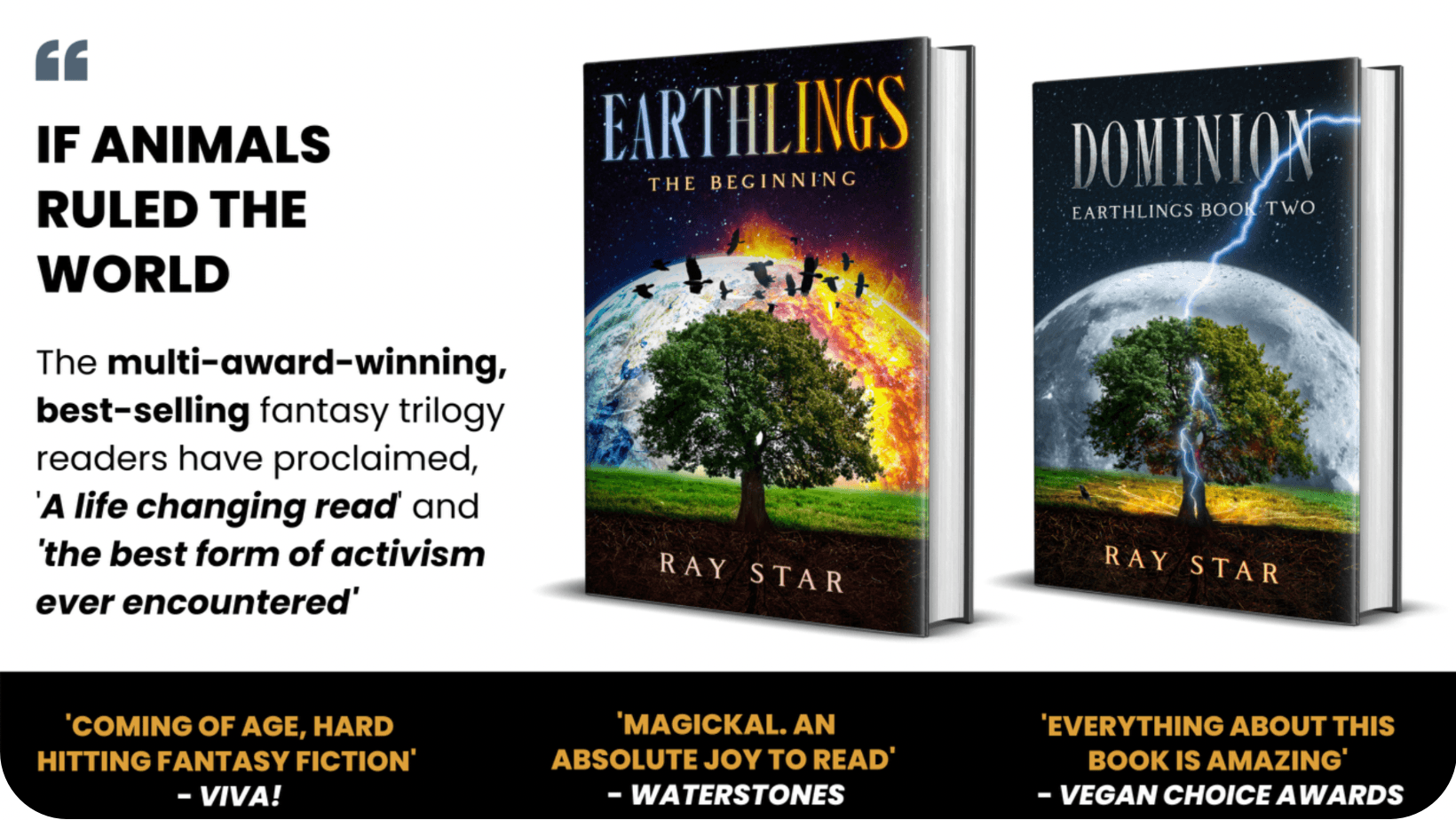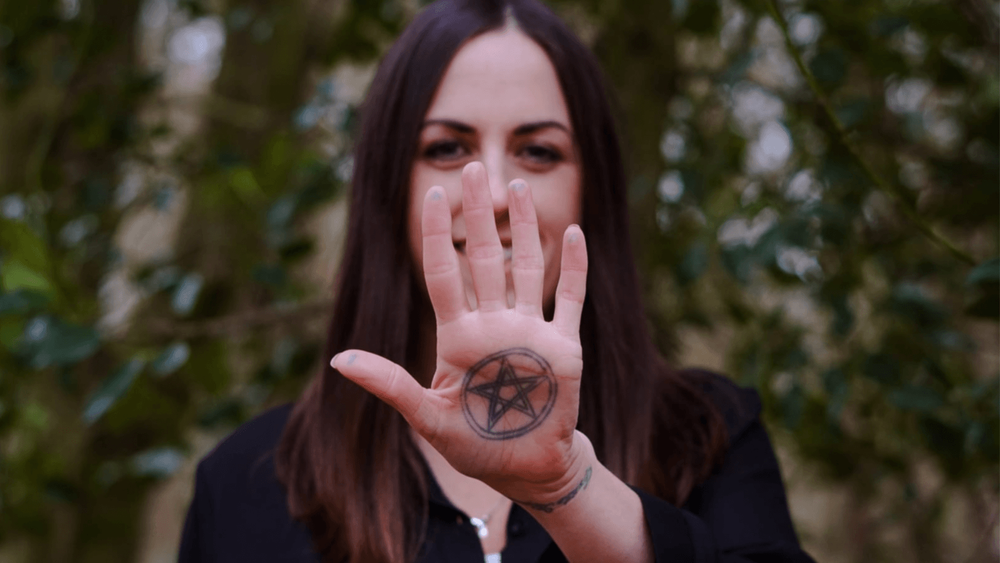Ray Star on writing a magical best-selling vegan fiction trilogy
For most people within the vegan community, the terminology; Earthling, will have been heard in many a passing conversation, from the groundbreaking animal rights documentary Earthlings, to animal rights activists such as Earthling Ed. And, another earthling to add to the list of advocates for animal rights through the arts, is none other than our in-house staff writer, Ray Star, multi-award-winning author of the Earthlings trilogy.
Her best-selling books have been dubbed the ‘vegan Harry Potter’, and are the story of a magick-born girl named Peridot. Raised away from the realities of her world, as she comes into her powers, Peridot has to decide whether to use her gifts to help, or whether the world may be better off left turning. We caught up with Ray to see the reaction to book two of the trilogy; Dominion, and to get the inside scoop on the upcoming final instalment, Land of Hope and Glory.
V-Land UK (V-L): One of the first things that grab a reader's attention are the titles of your books. Was there a reason you named them after vegan documentaries?
Ray Star (RS): I’ve watched a lot of vegan documentaries, and Earthlings was the one I found most impactful. It was so hard to watch, to the point that there were scenes I had to mute or fast forward. Yet, even though it’s equally upsetting and unsettling to witness, Earthlings is a vital documentary to gain a true understanding of just how vast our impact on animals across the globe truly is.
When we see the realities of what animals endure because of us, it’s almost impossible not to want to help. If every person on this planet were to watch these documentaries (Earthlings, Dominion, Land of Hope and Glory), I believe veganism as a way of life could genuinely be foreseeable. It was my hope that readers might watch them after reading each title, and I provide the links to watch for free in my author's note at the end of each book.
V-L: Each book is written in the first person, was there a particular reason for this decision?
RS: I want people to enjoy the story as if it were their own journey, and to do that, I needed to give multiple points of view, written in a way where various characters see different parts of their reality unfold, without any opinions on the page or forcing emotions from the reader. I want readers' reactions to each moment to be organic, natural, and their true response if it were them in that situation. Each chapter is written in the first person to (hopefully) enable the reader to experience their genuine emotion to each scene unfolding, whatever emotion that may be.
V-L: Peridot’s elemental powers seem to be linked in a way to her emotional state. Did you intend this, or was it a natural choice as you were writing?
RS: I wanted to make Peridot as relatable as possible or it could make the dystopian angle of the story hard to connect with, especially as she is magick-born. How many of us have felt so frustrated or angry that all we want to do is scream? Or, so sad that all we want to do is weep, so happy we could jump for joy, so excited we can’t sit still etc. It was my intention for readers to be able to connect with Peridot’s elemental magick through her emotional connection to it.
When Peridot’s fire starts raging, I want readers to feel her fire in their fingertips as they’re reading and start metaphorical fires of their own. There’s a little magick in all of us, I hope Peridot helps readers embrace their own.
V-L: From what sources have you drawn your magical inspiration? And is there a reason you spell magic with a K?
RS: I believe that magick lies in all of us. The ability to wake up each morning and breathe fresh air, drink clean water, feel warmth from the sun and watch nature blossom from the earth is magick of its own. Real magick, with a resounding, kicking-K!
Often, when people think of magic, we think of waving wands like in Harry Potter for example, and whilst yes, a wand can amplify a person's intention in ritual workings, it isn’t a necessity. Real magick is different, it comes from where we all came from. From nature. Just like the elements that Peridot is able to work within the story. When we listen to nature, the noise and hubbub dissipates, and a deep connection channels within our bodies. When we learn to connect with that channel, in time, most people will find their own magick.
By spelling the word differently, I could help readers connect and differentiate from waving wands magic, and connecting with the elements of magick.
As an eclectic witch, my own belief system originates from a mix of Pagan, Wiccan, Buddhist and Hindu practices. I follow the Wheel of the Year, celebrate the Solstices, set my intentions by moon cycles and give thanks to Mother Nature daily. I incorporated much of my own practice within Peridot’s upbringing, in the hope it might resonate with readers.

Ray Star
V-L: What did you think were the most important elements when creating the relationship between Peri and Val?
RS: The best stories I’ve read have relatable protagonists, despicable villains, and family dynamics that make you feel emotions and frustrations. I tried to ensure I ticked all those boxes with the characters in the Earthlings trilogy - especially Peridot’s relationship with her mother Val.
As a mother of two, I drew on my own feelings. If the characters' dystopian reality were my own, as a mother, I’d want to cocoon my child in safety and keep her from harm, just as Val tries to do. But as many parents have learnt, being overprotective will only hold our children back, and as hard as it may be, we have to let them take their own journeys, make their own mistakes, and experience their own hardships, as we all have. Val really struggles with that, and no doubt I will too as my boys grow.
V-L: Of all animals, what made you choose a chicken as the main villain?
RS: The world being run by an evil chicken (especially one named Alan) is particularly insane, so I get asked this a lot! Yet, to me, it makes complete sense. Imagine if the roles of humans and animals truly were reversed. After everything animals have endured from human actions (and inactions), which species would have the most hatred towards us? I believe it to be those we’ve hurt the most.
And whilst, when we think of animals ruling the world, wild cats such as lions and tigers may spring to mind, the reality is that we’ve pillaged their species to the brink of extinction. There simply aren't enough wild carnivores left in existence to make this a viable reality. But intensively farmed animals? They are alive in their trillions, and chickens are one of the most exploited animals on the planet, so with that in mind, Alan came to be. Chickens are the brains and cows and larger farmed animals are the brawn in the Earthlings trilogy.
V-L: How did you find balancing the serious elements of the story surrounding the reversal of the mistreatment of animals and humans, with maintaining the tone of a YA novel?
RS: If I’m honest, this was what made writing this trilogy so enjoyable. What we do to animals on a daily basis keeps me up at night. It haunts me. Do I want more people to be vegan? Yes. Do I want my books to help people find their vegan journey? Yes. Do I want my books to leave readers unable to sleep at night? No. This was where the use of fantasy, and the genre of Young Adult fiction helped me achieve balance.
The message of the trilogy is the reason I wrote the books, but if I made the books solely focused on the message, it could’ve had a negative impact, not a positive one. The use of a fantasy world helped me make the story exhilarating and enjoyable, instead of too heavy to endure. We need more vegan fiction in the world, it’s a gentle, but powerful tool for animal rights activists to bring about change with a widespread audience.
I was invited to speak at the vegan fiction authors’ roundtable hosted by Vegan FTA recently and there are some inspirational vegan fiction authors out there, MC Ronen, Whitney Mez, Ondine Sherman, Suli Autagavaia and A.E Copenhaver to name a few - but we need more!
V-L: Was there anything you wanted to do differently with book two (Dominion) to drive home the ethical implications of the story, and what has the reaction been like?
RS: Dominion is darker than Earthlings. I start off light and get heavier as the story progresses. We start off in book one focusing on dairy farming, book two on slaughterhouses, and book three on animals used for entertainment, sports and transportation. I was expecting a few negative reviews due to this, but so far, readers seem to be enjoying the darker side to the story.
V-L: What can readers expect from book three?
RS: Land of Hope and Glory takes us to new lands, introducing animals from outside of the UK and aquatic creatures. The magickal twists and turns come to an explosive conclusion, with a battle scene as the grand finale that I’m hoping will leave readers on the edge of their seats. It’s been a really tough one to write, as I’ve had to let go of some endearing characters that have played a pivotal role in the story. Many hold a place firmly in my heart, I cannot express just how much I did not want to say goodbye to some of them!
Writing Earthlings has been a real journey, I’m excited for the final book to be published and have the complete trilogy out in the world. I hope Peridot’s story plants the seed with readers that animals aren’t that different from us, and they deserve to live their lives free from exploitation, just as much as we do.
And, that with a little magick… anything is possible.
Land of Hope and Glory is set for release later this year and will be available to buy from Ray’s website, Amazon and bookstores worldwide. Although some of us are holding out for the movie! Looking for more vegan fiction for children and teens? Check out our young readers book list in helpful tools for raising vegan children, or for vegan fiction for adults, My Days of Dark Green Euphoria is one to add to your bookshelves.
